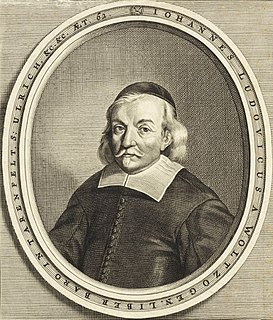Related Research Articles

Lelio Francesco Maria Sozzini, or simply Lelio Sozzini, was an Italian Renaissance humanist and theologian and, alongside his nephew Fausto Sozzini, founder of the Non-trinitarian Christian belief system known as Socinianism. His doctrine was developed among the Polish Brethren in the Polish Reformed Church during the 16th and 17th centuries and embraced by the Unitarian Church of Transylvania during the same period.

Socinianism is a nontrinitarian belief system deemed heretical by the Catholic Church and other Christian traditions. Named after the Italian theologians Lelio Sozzini and Fausto Sozzini, uncle and nephew, respectively, it was developed among the Polish Brethren in the Polish Reformed Church during the 16th and 17th centuries and embraced by the Unitarian Church of Transylvania during the same period. It is most famous for its Non-trinitarian Christology but contains a number of other heretical beliefs as well.
The Polish Brethren were members of the Minor Reformed Church of Poland, a Nontrinitarian Protestant church that existed in Poland from 1565 to 1658. By those on the outside, they were called "Arians" or "Socinians", but themselves preferred simply to be called "Brethren" or "Christians," and, after their expulsion from Poland, "Unitarians".

Johannes Crellius was a Polish and German theologian.

Fausto Paolo Sozzini, also known as Faustus Socinus, was an Italian theologian and, alongside his uncle Lelio Sozzini, founder of the Non-trinitarian Christian belief system known as Socinianism. His doctrine was developed among the Polish Brethren in the Polish Reformed Church during the 16th and 17th centuries and embraced by the Unitarian Church of Transylvania during the same period.

Stanisław Lubieniecki was a Polish Socinian theologist, historian, astronomer, and writer. He is the eponym of the lunar crater Lubiniezky.
The Racovian Catechism is a nontrinitarian statement of faith from the 16th century. The title Racovian comes from the publishers, the Polish Brethren, who had founded a sizeable town in Raków, Kielce County, where the Racovian Academy and printing press was founded by Jakub Sienieński in 1602.
The Bibliotheca antitrinitariorum, or Antitrinitarian Library, first published in 1684, is a posthumously published work of Christopher Sandius, an exiled Prussian Antitrinitarian in Amsterdam, who chronologically lists all the Arian and Socinian or Antitrinitarian authors from the Reformation to 1684, with a brief account of their lives, and a catalogue of their works. Rather than being a Library, as Frans Kuyper's publication (below), it is more a Bibliography.

Szymon Budny or Symon Budny was a Polish-Belarusian humanist, educator, Hebraist, Bible translator, Protestant reformer, philosopher, sociologist and historian, active in the territory of the Polish–Lithuanian Commonwealth. He was one of the first to promote the development of Belarusian culture in the Belarusian language. He was one of the leaders of the Polish Brethren.
Martin Czechowic (c.1532–1613) was a Polish Socinian (Unitarian) minister, Protestant reformer, theologian and writer.
Unitarianism, as a Christian denominational family of churches, was first defined in Poland-Lithuania and Transylvania in the late 16th century. It was then further developed in England and America until the early 19th century, although theological ancestors are to be found as far back as the early days of Christianity. It matured and reached its classical form in the middle 19th century. Later historical development has been diverse in different countries.

Samuel Przypkowski was a Polish Socinian theologian, a leading figure in the Polish Brethren and an advocate of religious toleration. In Dissertatio de pace et concordia ecclesiae, published in 1628 in Amsterdam, he called for mutual tolerance by Christians. He was also a poet in Latin and Polish.
Christopher Sandius Jr. was an Arian writer and publisher of Socinian works without himself being a Socinian.
Andrzej Wiszowaty Sr. was a Socinian theologian who worked with Joachim Stegmann (1595–1633) on the Racovian Catechism of 1605, and taught at the Racovian Academy of the Polish Brethren.
Joachim Stegmann Sr.(Potsdam 1595 - Cluj-Napoca 1633) was a German Socinian theologian, Bible translator, mathematician and rector of the Racovian Academy.

The Racovian Academy was a Socinian school operated from 1602 to 1638 by the Polish Brethren in Raków, Sandomierz Voivodeship of Lesser Poland. The communitarian Arian settlement of Raków was founded in 1569 by Jan Sienieński. The academy was founded in 1602 by his son, Jakub Sienieński. The zenith of the academy was 1616–1630. It was contemporaneous with the Calvinist Pińczów Academy, which was known "as the Sarmatian Athens". It numbered more than 1,000 students, including many foreigners. At this point it is estimated that ten to twenty percent of Polish intellectuals were Arians.

Jonasz Szlichtyng was a Polish nobleman, theologian of the Socinian Polish Brethren and father of Krzysztof Szlichtyng.
Henry Hedworth (1626–1705) of Huntingdon was a Unitarian writer.

Johann Ludwig von Wolzogen (1599–1661) was an Austrian nobleman and Socinian theologian.
Benedykt Wiszowaty was a Polish Socinian, nobleman, author and publisher.
References
- ↑ Philip Knijff, Sibbe Jan Visser, Piet Visser Bibliographia Sociniana: a bibliographical reference tool for the study of Dutch Socinianism and Antitrinitarianism.